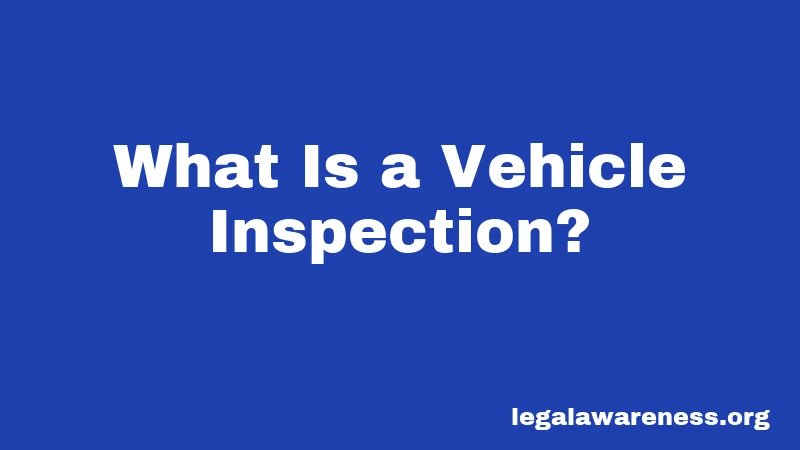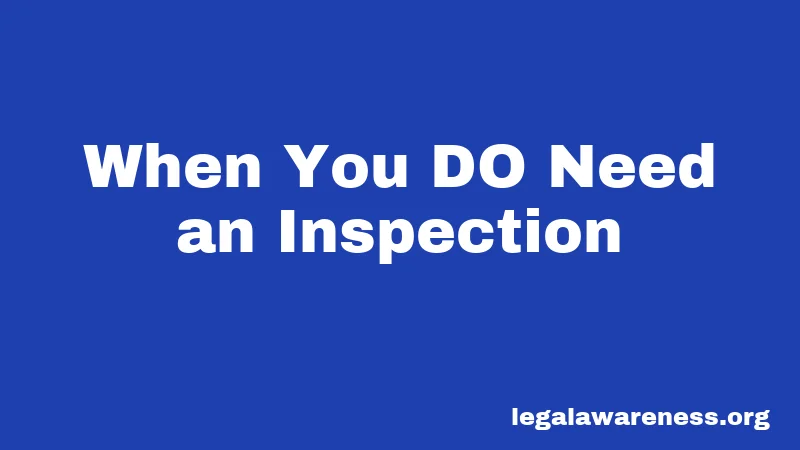Michigan Vehicle Inspection Laws in 2026: The Surprisingly Simple Truth
Most people think Michigan requires annual vehicle inspections. Seriously. But here’s the thing—it doesn’t. Not for most vehicles, anyway. Michigan actually has some of the most relaxed inspection laws in the entire country. If you’re moving here from California or New York, this might feel too good to be true. But it is. Let’s break down what’s actually required and what you can skip.
The good news? You’ll spend way less time and money on inspections compared to drivers in other states. The not-so-great news? You still need to know the exceptions. Some vehicles absolutely require inspections. Missing that requirement? That could create real problems.
What Is a Vehicle Inspection?

A vehicle inspection is basically a safety check. Someone looks at your car to make sure it’s safe to drive. They check the brakes, tires, lights, and other important parts. It’s designed to protect you and everyone else on the road.
Most states require these inspections every year or every two years. Michigan, though? Not really. Here’s why. Michigan believes modern cars already meet federal safety standards from the factory. So the state skips the yearly paperwork and lets you handle it yourself. Pretty straightforward, right?
The Main Rule: Most Drivers Don’t Need Inspections
This is huge. Here it is straight: Michigan does not require regular safety or emissions inspections for most passenger vehicles. Yep, you read that right. You can own a car in Michigan and never get a state inspection. Ever.
This saves Michigan drivers thousands of dollars over a vehicle’s lifetime. No annual inspection appointments. No waiting around at inspection stations. No worry about your car failing and needing expensive repairs to pass. It’s one of the perks of living in Michigan.
But wait—there are exceptions. And those exceptions matter. Stay with me here.
When You DO Need an Inspection

Okay, pause. Read this carefully. Even though Michigan doesn’t require regular inspections for most cars, certain situations absolutely demand them. Miss these requirements and you could face penalties. Here’s what triggers an inspection requirement.
Salvage Title Vehicles
This one’s big. If your vehicle has a salvage title, it must be inspected. What’s a salvage title? It’s what insurance companies and dealers apply when a car is damaged so badly that repair costs exceed 75% of the car’s value. Think accident damage, flood damage, or serious collision.
You can’t just drive a salvage vehicle on Michigan roads. It doesn’t matter if you fixed it perfectly. It needs a certified inspection by a specially trained salvage vehicle inspector. Only after passing inspection can you get a “rebuilt salvage” title that lets you drive legally.
The inspection costs around $100. It verifies that repairs were done properly and safely. The inspector checks that the VIN (Vehicle Identification Number) is legitimate and that parts used were legal and appropriate. It’s thorough.
You’ll need to complete an Application for Salvage Vehicle Inspection form (TR-13A). Your mechanic signs off certifying repairs were done correctly. Then a certified salvage inspector does the official inspection. Only then can you apply for the rebuilt title and license plates. It takes time, but it protects you and future buyers.
Rideshare Vehicles (Uber, Lyft)
Wondering if this applies to you? Here’s the deal: If you drive for a rideshare company in Michigan, your vehicle might need an inspection. But—and this is important—the rule depends on your car’s age.
If your vehicle is less than 5 years old, congratulations. No inspection required. You’re good to go. But if your vehicle is 5 years old or older, you absolutely need a safety inspection. Lyft, Uber, and similar companies require this. It’s their rule, not Michigan’s, but it’s mandatory if you want to drive for them.
The inspection is annual (or more frequently, depending on the company). It typically checks 19-25 different vehicle components. Brakes, tires, lights, wipers, seatbelts, and the engine all get examined. You can get this done at a licensed mechanic. Some companies allow virtual video inspections too, which is convenient.
You’ll need to provide documentation showing your vehicle passed. Upload the completed inspection form to your rideshare app, and you’re set. The inspection cost varies but typically runs $20-$50 depending on where you go.
Sound complicated? It’s actually not. Once you do it once, the process becomes routine. Just mark your calendar for renewal.
VIN Inspections
VIN inspections are less common, but they do happen. Think of it like a vehicle identity check. Michigan law enforcement might require a VIN inspection if you’re registering an out-of-state vehicle, or if there’s suspicion of theft or title fraud.
The inspector verifies that the Vehicle Identification Number on your vehicle matches your registration documents. They check that the VIN plate hasn’t been tampered with. They want to make sure you actually own what you claim to own.
You can get a VIN inspection at your local police department or Secretary of State office. It’s typically free or very inexpensive. The process is quick—usually just 15-30 minutes.
Commercial and For-Hire Vehicles
Commercial vehicles have different rules. If you operate a taxi, limousine, or commercial truck in Michigan, you likely need regular inspections. These requirements vary based on the type of vehicle and its use.
Commercial truck drivers for for-hire services must pass annual inspections. These are stricter than standard vehicle inspections. They check compliance with federal motor carrier safety standards. The state transportation department (MDOT) handles these inspections and can conduct them at their scheduled times and locations.
Emissions Testing: Limited to Certain Areas
Michigan also has some emissions testing rules, but only in specific counties. Wondering if your area requires emissions testing? Here’s the breakdown.
Emissions testing applies only in Kent, Ottawa, and Muskegon counties. Most of Michigan is exempt. If you don’t live in those three counties, you don’t need emissions testing. Super simple.
If you do live in one of those counties, emissions testing applies to vehicles from 1975 and newer. The test checks your vehicle’s exhaust system to ensure it’s not polluting excessively. It’s designed to protect air quality in areas that struggle with pollution.
The test happens only during vehicle registration and title transfer. It’s not annual. You do it once when required, then it’s done. That’s basically it.
What Happens If You Break the Rules

Let’s talk about penalties. Nobody wants to get in trouble with the law. If you violate Michigan’s inspection requirements, consequences can add up fast.
If you’re supposed to have an inspection and you don’t, you could face fines. The exact amount depends on the type of violation. For rideshare vehicles, operating without a current inspection can get you deactivated from the platform. Your ability to earn money stops immediately.
For salvage vehicles, driving without proper inspection certification is illegal. You could face citations and fines. Law enforcement can pull you over and cite you. Your vehicle could be impounded.
For commercial vehicles, operating without required inspections carries federal penalties too. The Department of Transportation can levy fines and place vehicles out-of-service. If you’re operating a for-hire service and your vehicle isn’t inspected, you’re breaking the law.
The best approach? Just stay compliant. It’s way easier and cheaper than dealing with penalties.
How to Get an Inspection When You Need One
Okay, let’s get practical. If you need an inspection in Michigan, here’s exactly what to do.
For Salvage Vehicles
First, complete form TR-13A from the Michigan Secretary of State website. You’ll list all major parts used to rebuild your vehicle. Have your licensed mechanic certify that repairs were done properly. Then, find a certified salvage vehicle inspector in your area. You can search for inspectors on the Secretary of State website. Contact them to schedule an appointment. Pay the inspection fee (usually around $100). Once you pass, you’ll get certification. Take that to the Secretary of State and apply for your rebuilt salvage title.
For Rideshare Vehicles
Head to your rideshare company’s driver app. Look for document requirements or inspection options. Download their official inspection form. You have a few choices: take your vehicle to a licensed mechanic with the form, schedule a virtual video inspection, or visit a rideshare inspection facility in your area. The mechanic completes the inspection, signs the form, and takes photos. Upload it to your app. That’s it. Some companies like Lyft and Uber accept third-party inspection services too.
For VIN Inspections
Visit your local police department, Michigan State Police post, or Secretary of State office. Tell them you need a VIN inspection. Bring your vehicle and your registration documents. The inspector looks at your VIN and verifies it matches your paperwork. Takes 15-30 minutes. You’ll get a completed form. Done.
Special Circumstances and Exceptions
Life gets messy sometimes. Here are some special situations you should know about.
If you’re moving to Michigan from another state, you’ll need to register your vehicle in Michigan. You might need a VIN verification depending on your situation. Contact your local Secretary of State office to confirm.
If you’re buying a used vehicle privately in Michigan, the seller must provide an emissions test certificate if you’re in Kent, Ottawa, or Muskegon counties. The seller handles this before sale.
If your vehicle has been declared a total loss (given a salvage title), you can’t legally drive it until it’s rebuilt and inspected. Period. No exceptions.
If you’re restoring a classic or vintage car and it gets a salvage title, the inspection still applies. Even though it’s an old car, if it has a current salvage title, it needs certification before road use.
Personally, I think these rules make sense. They protect people without creating unnecessary bureaucracy for most drivers.
Quick Tips to Stay Compliant
Here’s what you need to do right now. First, figure out if you need an inspection. Most of you won’t. You’re probably fine.
But if you drive for rideshare, own a salvage vehicle, or are registering an out-of-state car, then look into it. Don’t wait until your driver account gets deactivated or you try to register your vehicle.
Second, mark your calendar. If you have an inspection requirement, write down when it’s due. Set a reminder. Inspections expire. You need current documentation.
Third, use licensed mechanics and certified inspectors. Don’t try to cut corners with unlicensed folks. Official inspections must come from authorized sources.
Fourth, keep your documentation. Save your inspection forms. Keep them in your vehicle if required. Have copies at home.
Frequently Asked Questions
Does Michigan require annual vehicle safety inspections? No. Michigan does not require regular safety inspections for most passenger vehicles. You only need inspections in specific situations like salvage titles, rideshare driving, or VIN verification.
What if I move to Michigan from a state that requires inspections? Congratulations! You’re leaving inspections behind. Once you register your vehicle in Michigan, you no longer need regular safety or emissions inspections (unless you fall into an exception category). It’s genuinely one of the best parts about living in Michigan.
Are emissions tests required everywhere in Michigan? No. Only Kent, Ottawa, and Muskegon counties require emissions testing. If you live anywhere else in Michigan, you don’t need it.
What happens if my rideshare vehicle inspection expires? Your driver account gets deactivated. You can’t accept rides or earn money until you provide a current inspection. Get it renewed before expiration.
Can I do my own vehicle inspection? No. Inspections must be conducted by licensed mechanics or certified inspectors. DIY inspections don’t count for legal compliance.
Is a salvage vehicle inspection the same as a regular vehicle inspection? No. Salvage inspections are specialized. They verify repairs were done correctly and safely. A regular mechanic can’t perform an official salvage inspection. You need a certified salvage vehicle inspector.
How much do salvage vehicle inspections cost? Usually around $100. The fee goes to the law enforcement agency employing the inspector. Exact costs can vary slightly by county.
Final Thoughts
Michigan gives you a pretty sweet deal. Most of you get to skip regular inspections entirely. That saves time, money, and hassle compared to other states.
But don’t use this as an excuse to neglect your vehicle. Even though Michigan doesn’t require regular inspections, keeping your car maintained is still crucial. Get your brakes checked. Replace worn tires. Keep your lights working. Maintain your vehicle properly.
If you do fall into an inspection category—rideshare, salvage title, or VIN verification—just handle it. Get it done on time. Keep your documentation current. It’s straightforward.
For the vast majority of Michigan drivers, you’re free from inspection requirements. Count yourself lucky. Enjoy the simplified process. And remember: just because you don’t have to get an official inspection doesn’t mean you should ignore vehicle maintenance.
Now you know the basics. Stay informed, stay safe, and when in doubt, check with your local Secretary of State office or the Michigan Department of State.
References
- Michigan Secretary of State Vehicle Services
- Michigan Vehicle Code MCL 257.715
- Salvage Vehicle Inspection Application (TR-13A)
- MCL 257.217c – Salvage Vehicle Requirements
- Lyft Michigan Driver Information
- Michigan Department of State Dealer Manual Chapter 5
- Michigan Vehicle Inspection Requirements Overview
